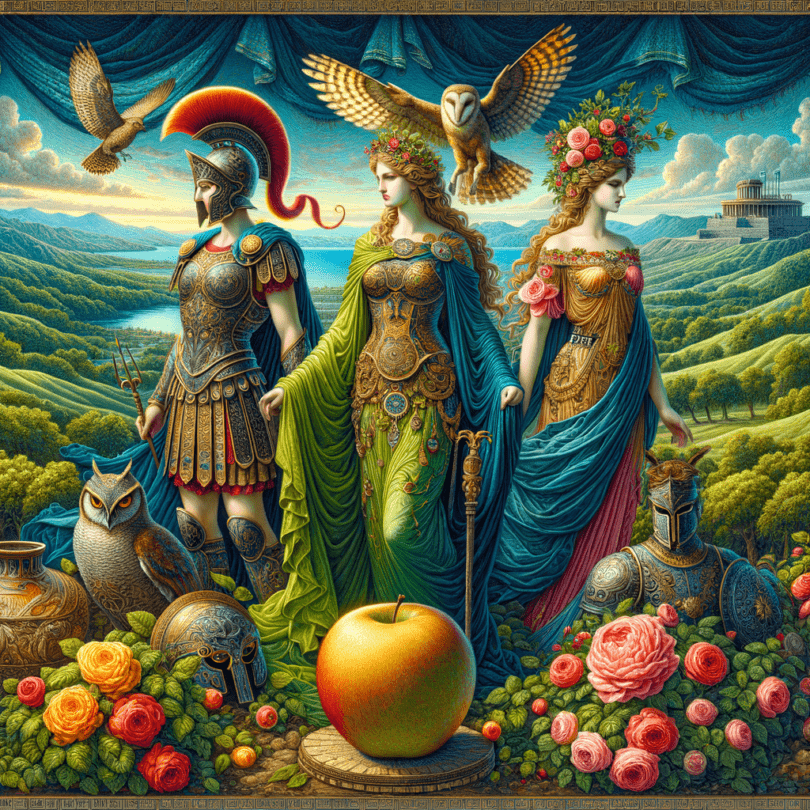Isn’t the Trojan War just the most enchanting mess of mythology woven through our history? It’s like that story so grand, it grabs you by the collar and refuses to let go across time and space. We’ve seen its threads woven into myths and often wondered, “Did any of this actually happen?” And yet, despite the confusion of legends and hazy facts, this story has been retold by countless generations. It’s like a massive game of ancient telephone! Seriously, the journey backward in time is all about letting our imaginations run wild, not promising rock-solid facts – after all, we’re dealing with gods and epic squabbles here!
The Golden Apple and the Wedding of Discord
Get cozy folks, because this tale kicks off with a wedding – cue the drama! Picture this: Peleus, a mortal chap, marries Thetis, a gorgeous sea nymph. It’s a feast fit for gods and mortals. But of course, what’s a party without party-crashers? In storms Eris, the goddess of discord, who—surprise, surprise—wasn’t invited. She, being classic Eris, decides it’s not a party without a little chaos. Sneakily, she tosses in a golden apple marked for ‘the fairest’, and BOOM! You’ve got yourself divine drama!
Three goddesses—Hera, Athena, and Aphrodite—eye the apple like it’s the last slice of cake. Zeus, the big boss of gods, seeing a cosmic headache brewing, cleverly decides to pass the hot potato to Paris, a Trojan prince probably just minding his own business, caught at the world’s worst crossroads. Poor Paris’s choice here is what sets the whole crazy saga rolling.
Paris’s Judgement and Divine Bargaining
Picture Paris as a contestant on an ancient game show with no consolation prize. Each goddess pulls out the stops with bribes! Hera offers power (yawn), Athena promises glory in battle (okay, cool), but Aphrodite pledges to hook him up with Helen, the world’s drop-dead beauty. Let’s be real: Paris goes full starry-eyed and picks Aphrodite. Swoon over love, who wouldn’t? But, oh boy, does this decision have cosmic ripples!
It’s a very human mistake: young love clouding judgment. This choice makes the gods a bit cranky and lights the fuse for what’s about to become one massive, unforgettable standoff.
Spartan Love and the Face that Launched a Thousand Ships
Things snowball, as you’d guess. Helen, the prized beauty, is actually already hitched, living as the Spartan queen, married to Menelaus. You can sense the oncoming storm, right? The scandal of it all! When Paris steals (or maybe she fled willingly?) Helen away, Menelaus is, understandably, flipping tables with anger.
Here’s where it gets juicy. Picture a tabloid-worthy scandal splashing over ancient Greece! Menelaus calls on his big bro Agamemnon, Mycenae’s kingpin. The Greek forces rally to go knock some sense into Troy or, you know, reclaim honor or something. It’s a heady blend of pride, love, power, keenly stirred into the cauldron of human ambition.
The Human Element and War’s Eruption
I’m pausing here because this whole saga is glued together by very human emotions—we’ve got love, anger, envy—all the juicy bits that make us us. It’s a testament to how we all can be caught chasing our “golden apples,” hushed by divine whispers but driven by earthly desires and mistakes.
The collateral damage here isn’t just the toppled walls of Troy; it’s the human heart, entwined yet squashed by chaotic divine theatre. With armies ready and oaths binding, war becomes inevitable, locking humans and gods alike in a timeless dance on history’s stage.
The Clash of Titans, Heroes and Heroines
As the war drums start booming, we’re drawn into a vibrant shuffle of characters. Picture it! There’s Achilles, the warrior not far off from a superhero, with strength mixed with a deep vulnerability. And Hector, the brave heart of Troy, battling with noble resolve.
Don’t forget the women, oh no! In their silence or defiance, they wield significant influence. Helen, Cassandra, and Andromache shine with their own tales—strength etched in every decision and sorrow amidst the chaos.
These characters remind us that every epic battle is personal too. Behind the clatter of swords lies their dreams, losses, laughter—stories within the story that linger in our shared reflection.
And So the Tale Lived On
Why do we remain so enthralled by this mix of divine mischief and heartfelt human drama? Maybe not every detail happened exactly this mythic way, but that doesn’t really matter, does it? The line between myth and reality is fascinatingly fuzzy, drawing our imaginations into the vast unknown where gods and men once danced.
Each generation sees something new in these stories—a kaleidoscope of emotions and lessons, reflecting a spectrum of humanity that’s all too real in its mythical grandeur. These tales endure because they mirror us, our flawed searches, our laughter, and tears. And as I sit marveling at this timeless tale, what strikes me the most is its humbling embrace of humanity—reminding us that our dreams and stumbles make our epic. Past or present, it’s the retelling that truly shapes our view of this spectacular world and our life within it.

